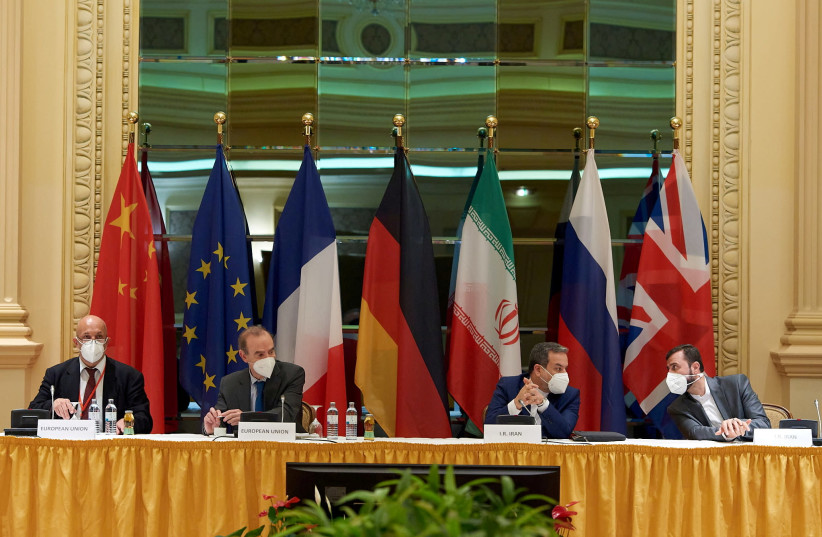Israel has seemingly upped its “war between the wars” campaign against Iran in Syria, as the country’s top officer warns that the IDF is accelerating its plans to deal with Iran’s nuclear program.
At least seven airstrikes targeting Iranian and Shi’ite militias have been blamed on Israel in the past month alone, the most recent one on Monday in the Homs province, as well as targets belonging to the regime of Bashar Assad and to Iranian militias in the northwestern coastal city of Tartus.
Last week Israel was blamed for an airstrike targeting a military post on the outskirts of Damascus, and last October five people were killed in another alleged Israeli airstrike in a rare daytime strike outside Damascus.
cnxps.cmd.push(function () { cnxps({ playerId: ’36af7c51-0caf-4741-9824-2c941fc6c17b’ }).render(‘4c4d856e0e6f4e3d808bbc1715e132f6’); });
if(window.location.pathname.indexOf(“/jpost-tech/”)!=-1){ document.getElementsByClassName(“divConnatix”)[0].style.display =”none”; var script = document.createElement(‘script’); script.src = ‘https://static.vidazoo.com/basev/vwpt.js’; script.setAttribute(‘data-widget-id’,’616dd69d1b04080004ac2cc0′); document.getElementsByClassName(‘divVidazoo’)[0].appendChild(script); }else if(window.location.pathname.indexOf(“/israel-news/”) != -1 || window.location.pathname.indexOf(“/omg/”) != -1 || window.location.pathname.indexOf(“/food-recipes/”) != -1 || window.location.pathname.indexOf(“/science/”) != -1){ document.getElementsByClassName(“divConnatix”)[0].style.display =”none”; var script = document.createElement(‘script’); script.src = ‘https://static.vidazoo.com/basev/vwpt.js’; script.setAttribute(‘data-widget-id’,’60fd6becf6393400049e6535′); document.getElementsByClassName(‘divVidazoo’)[0].appendChild(script); }else if(window.location.pathname.indexOf(“/health-and-wellness/”) != -1){ document.getElementsByClassName(“divConnatix”)[0].style.display =”none”; var script = document.createElement(‘script’); script.src = ‘https://player.anyclip.com/anyclip-widget/lre-widget/prod/v1/src/lre.js’; script.setAttribute(‘pubname’,’jpostcom’); script.setAttribute(‘widgetname’,’0011r00001lcD1i_12246′); document.getElementsByClassName(‘divAnyClip’)[0].appendChild(script);}
While Israel may be taking advantage of the unusually clear skies during a season where there are usually heavy clouds, it also comes weeks before Iran and the West are set to return to the negotiating table in Vienna.
The indirect talks are being brokered by the European Union and aim to bring Washington and Tehran back into the Joint Comprehensive Plan of Action, the formal title of the Iran nuclear deal, which the United States left under former president Donald Trump.
 European External Action Service (EEAS) Deputy Secretary General Enrique Mora, Iranian Deputy at Ministry of Foreign Affairs Abbas Araghchi and Iran’s ambassador to the U.N. nuclear watchdog Kazem Gharibabadi wait for the start of a meeting of the JCPOA Joint Commission in Vienna, Austria May 1, 202 (credit: EU DELEGATION IN VIENNA/HANDOUT VIA REUTERS)
European External Action Service (EEAS) Deputy Secretary General Enrique Mora, Iranian Deputy at Ministry of Foreign Affairs Abbas Araghchi and Iran’s ambassador to the U.N. nuclear watchdog Kazem Gharibabadi wait for the start of a meeting of the JCPOA Joint Commission in Vienna, Austria May 1, 202 (credit: EU DELEGATION IN VIENNA/HANDOUT VIA REUTERS)
It is believed that Iran is continuing to develop the capabilities to produce a nuclear weapons arsenal and to produce ballistic missiles capable of carrying nuclear warheads.
And with no diplomatic options likely to push Tehran to stop its nuclear program, Israel’s military believes that the Islamic Republic needs to be aware that should it continue with its program, it will face a military option ready to stop it.
IDF Chief of Staff Lt.-Gen. Aviv Kohavi warned Tuesday during a meeting of the Knesset’s Foreign Affairs and Defense Committee that “the IDF is accelerating its operational plans and readiness to deal with Iran and its military nuclear threat.”
While an attack by Iranian proxies such as Hezbollah is a major concern for the IDF, it’s Iran’s nuclear and ballistic missile programs that worry Israel’s defense establishment the most.
“I am pleased that the budget allows us to meet the range of challenges, including a significant improvement of all operational plans of procurement, of training, both of the regular and of the reserve forces,” Kohavi said.
“The State of Israel has many security challenges in six different arenas,” he said, adding that “the IDF acts both defensively, in counterattacks, and offensively. In the past year we have continued to act against our enemies, including in covert operations throughout the Middle East.”
As reported by The Jerusalem Post, some NIS 5 billion of the defense budget will go exclusively to Israel’s “war between the wars” campaign against Iran. The funds will be allocated to intelligence gathering capabilities, increasing the military’s target bank even further, and training.
The budget will also allow the IDF to complete other important defensive projects, such as building the wall along the border with Lebanon and implementing a permanent defensive coverage in the airspace of northern Israel with additional fixed Iron Dome batteries that would be able to shoot down incoming drones or missiles.
In the past year, there has also been an increase in the number of targets struck during the campaign operations, with most airstrikes targeting Iranian entrenchment and weapons smuggling in Syria. Operations have even occurred at sea, where alleged Israeli attacks against Iranian ships have stopped an estimated $1.2 million-$2m. from going to terrorist groups in the Middle East.
“The IDF will continue to act to remove the threats and will respond forcefully to any violation of sovereignty, whether it is from the Gaza Strip or in the north, whether it is an Iranian force or a Palestinian force.”

